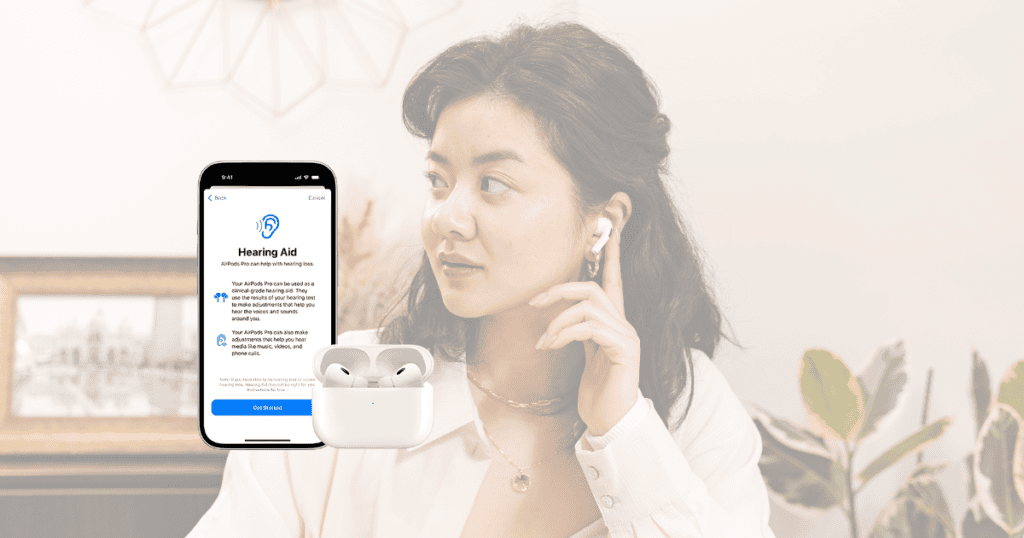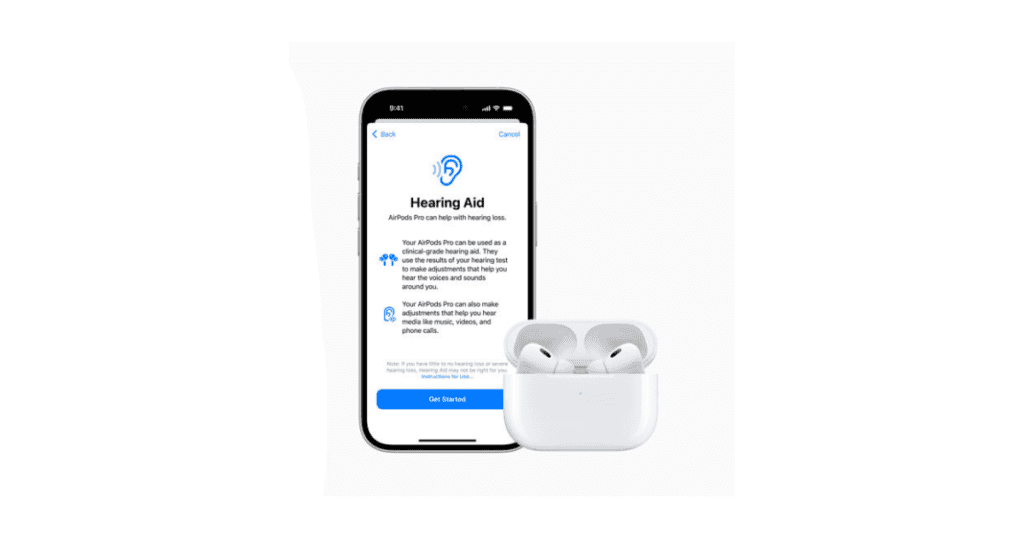The recent FDA approval of the AirPods Pro 2 as an over-the-counter hearing aid signifies a transformative shift in auditory health solutions, particularly for individuals experiencing mild to moderate hearing loss. This innovative feature not only enhances sound amplification but also offers users a degree of customization previously reserved for traditional hearing aids. As we explore the implications of this development, it is essential to contemplate how such technology might reshape perceptions of hearing aids and the broader landscape of auditory health. What might this mean for the future of hearing assistance devices?
FDA Approval Overview
The FDA’s recent approval of over-the-counter hearing aid software marks a pivotal moment in the landscape of hearing health. This innovative software transforms certain headphones, such as the AirPods Pro, into personalized hearing aids for adults aged 18 and older with mild to moderate hearing impairments.
The FDA’s decision aligns with a broader initiative aimed at enhancing accessibility to hearing support by removing the prescription requirement for hearing aids, a change implemented under new regulations in 2022.
The authorized software allows for real-time sound amplification, focusing on improving clarity for both voices and environmental sounds. A clinical study involving 118 participants demonstrated significant benefits from this software, indicating its efficacy compared to traditional hearing aids.
This advancement not only addresses a critical public health issue but also promotes inclusivity in managing hearing loss.
The anticipated rollout of the software is set for fall 2024, representing a significant leap forward in hearing aid technology. By leveraging existing technology, such as the AirPods Pro, this development offers a more personalized and accessible solution for individuals seeking improved hearing support, ultimately transforming the way hearing impairments are addressed.
AirPods Pro 2 Features
AirPods Pro 2 introduces a revolutionary hearing aid feature tailored for individuals with mild to moderate hearing impairments. This innovative functionality enhances sound amplification, specifically designed to improve the listening experience for users facing hearing challenges.
By leveraging real-time sound adjustments, the AirPods Pro 2 effectively amplifies essential sounds, such as human voices and ambient noise, ensuring that users can engage in conversations and navigate their environments with greater ease.
A significant aspect of this feature is its ability to create personalized sound profiles. Users can complete a hearing test via their iOS devices, which allows the AirPods Pro 2 to customize audio settings based on individual hearing needs.
This tailored approach enhances daily communication and environmental awareness, making the device a valuable tool for those with hearing difficulties.
The software update enabling this hearing aid functionality is set to roll out in fall 2024, marking an important milestone in the integration of hearing support within consumer technology.
With the AirPods Pro 2, Apple is not only enhancing its product lineup but also addressing a vital public health issue by improving accessibility to hearing solutions.
Benefits of Hearing Aid Functionality
Addresses Widespread Hearing Loss: Over 30 million American adults with mild to moderate hearing impairments gain access to essential sound amplification.
Real-Time Sound Enhancement: Focuses on human voices and environmental sounds, improving communication and social interaction.
Personalized Sound Profiles: Allows users to create custom hearing profiles through a simple hearing test, optimizing sound amplification to individual needs.
Reduces Hearing Loss Stigma: Integrating hearing aids into popular consumer devices like AirPods Pro 2 normalizes their use and promotes a more socially acceptable approach to hearing support.
Improves Mental Health: By eliminating communication barriers that can lead to social isolation, the technology promotes overall well-being.
Increased Accessibility: Over-the-counter availability makes hearing aids more accessible and affordable, reaching a broader range of users.
Impact on Hearing Health
Approximately 30 million American adults face some level of hearing loss, a condition that greatly impacts their quality of life and overall well-being.
This health issue has prompted considerable advancements in the availability and accessibility of hearing solutions, particularly with the recent FDA approval of over-the-counter hearing aids.
The introduction of these devices has several notable impacts on hearing health:
- Improved Accessibility: Over-the-counter hearing aids allow individuals with mild to moderate hearing loss to obtain necessary support without the need for prescriptions.
- Enhanced Quality of Life: Increased awareness and availability of hearing aids can lead to better communication and engagement in daily activities, reducing feelings of isolation.
- Personalized Hearing Solutions: The integration of technology into everyday devices, like the AirPods Pro 2, offers tailored hearing support to meet individual needs.
- Prevention of Cognitive Decline: Addressing untreated hearing loss can considerably mitigate risks associated with social isolation and cognitive decline, promoting overall mental health.
User Experience and Feedback
As users increasingly explore the hearing aid capabilities integrated into the AirPods Pro 2, initial feedback reveals a transformative impact on their auditory experiences.
The ability to customize hearing aid functionality through a simple iOS hearing test empowers users to create tailored sound profiles that cater to their specific hearing needs. This level of personalization enhances the overall user experience, allowing individuals to engage more meaningfully in conversations by amplifying critical frequencies, particularly those associated with human voices and important environmental sounds.
Users have reported significant improvements in daily communication, indicating a marked increase in auditory awareness.
The seamless integration of hearing assistance features with existing audio capabilities has garnered positive feedback, highlighting the device’s role in improving accessibility to hearing support. Many users have expressed appreciation for the innovative and affordable nature of this solution, which fits effortlessly into their daily lives.
The anticipation surrounding the AirPods Pro 2’s hearing aid feature underscores a growing demand for accessible hearing solutions, promising to reshape how individuals manage hearing loss in a modern context.
Comparison With Traditional Hearing Aids
The emergence of the AirPods Pro 2 hearing aid feature marks a significant shift in the landscape of auditory support, particularly when compared to traditional hearing aids. With FDA approval for over-the-counter (OTC) hearing aids, users now have the opportunity to address their hearing needs with greater flexibility and accessibility.
Here are some key comparisons between AirPods and traditional hearing aids:
- Customization: Unlike traditional hearing aids that often require professional fitting, AirPods allow users to conduct hearing tests via mobile devices, enabling personalized sound profiles.
- Affordability: Traditional hearing aids can be costly and may involve ongoing maintenance. In contrast, OTC options like AirPods aim to reduce financial barriers, making hearing support more accessible.
- User Independence: The AirPods Pro 2 empower users to customize their auditory experience independently, which is often not possible with traditional hearing aids requiring audiologist involvement.
- Real-Time Functionality: The AirPods feature real-time amplification of speech and environmental sounds, a capability that enhances usability compared to standard traditional devices.
Future Developments in Hearing Technology
Innovations in hearing technology are poised to revolutionize how individuals with hearing impairments access auditory support. The recent FDA approval of over-the-counter hearing aids marks a significant shift in accessibility and acceptability, allowing consumers to acquire devices without prescriptions. This change will likely enhance the user experience, making hearing aids more user-friendly and widely adopted.
Future developments in this field aim to integrate advanced artificial intelligence and machine learning, which will enhance hearing aid functionality. These technologies will allow devices to learn and adapt to individual hearing profiles, improving sound quality and personalization.
As research indicates, improved hearing aid technology can help mitigate social isolation and cognitive decline associated with untreated hearing loss.
Moreover, the integration of hearing assistance features into everyday consumer electronics is expected to create a seamless user experience, encouraging broader acceptance of hearing support solutions.
By prioritizing accessibility, personalization, and user-friendliness, the future of hearing technology holds great promise for enhancing the quality of life for individuals with mild to moderate hearing impairments.
These advancements will guarantee that auditory support becomes a standard aspect of daily living, fostering a more inclusive society.
MacReview Verdict
The FDA’s approval of AirPods Pro 2 as an over-the-counter hearing aid represents a transformative shift in auditory health technology. While some may question the effectiveness of consumer-grade devices compared to traditional hearing aids, the customizable features and accessibility offered by this innovation greatly enhance the auditory experience for individuals with mild to moderate hearing loss. By reducing barriers to access, this advancement promotes inclusivity and fosters a greater understanding of hearing health, ultimately improving the quality of life for many users.




